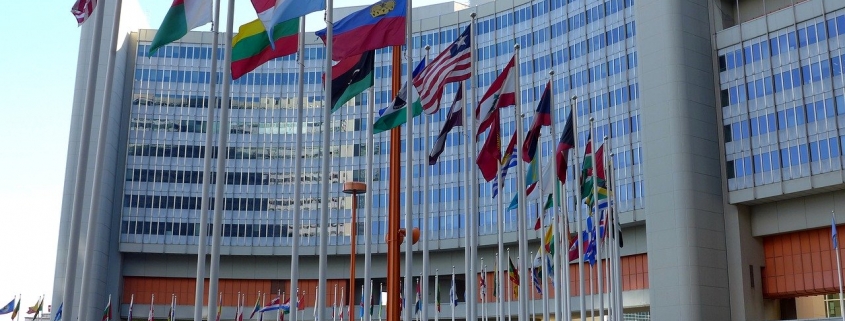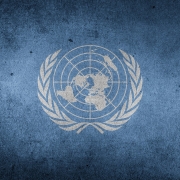What are the founding principles of the United Nations?
Topic of Study [For H1/H2 History Students]:
Paper 1: Safeguarding International Peace and Security
Section B: Essay Writing
Theme III Chapter 1: Formation of the United Nations
Historical Context: The San Francisco Conference
In 1945, the 46 nations attended San Francisco Conference and signed the United Nations Declaration. Later, four other states joined the Conference – the Byelorussian Soviet Socialist Republic, the Ukrainian Soviet Socialist Republic, newly-liberated Denmark and Argentina. In total, fifty nations became the founding members of the United Nations.
On 24 October 1945, the United Nations was officially formed, with the Charter taking effect subsequently.
The aims of the United Nations
The following refers to the four purposes stated in the Charter:
1. To maintain international peace and security, and to that end: to take effective collective measures for the prevention and removal of threats to the peace, and for the suppression of acts of aggression or other breaches of the peace, and to bring about by peaceful means, and in conformity with the principles of justice and international law, adjustment or settlement of international disputes or situations which might lead to a breach of the peace;
2. To develop friendly relations among nations based on respect for the principle of equal rights and self-determination of peoples, and to take other appropriate measures to strengthen universal peace;
3. To achieve international co-operation in solving international problems of an economic, social, cultural, or humanitarian character, and in promoting and encouraging respect for human rights and for fundamental freedoms for all without distinction as to race, sex, language, or religion; and
4. To be a centre for harmonizing the actions of nations in the attainment of these common ends.
Article 1, Chapter 1, UN Charter.
The principles of the United Nations
The following section outlines the principles that shape the functions of the members in this international organisation:
1. The Organization is based on the principle of the sovereign equality of all its Members.
2. All Members, in order to ensure to all of them the rights and benefits resulting from membership, shall fulfill in good faith the obligations assumed by them in accordance with the present Charter.
3. All Members shall settle their international disputes by peaceful means in such a manner that international peace and security, and justice, are not endangered.
4. All Members shall refrain in their international relations from the threat or use of force against the territorial integrity or political independence of any state, or in any other manner inconsistent with the Purposes of the United Nations.
5. All Members shall give the United Nations every assistance in any action it takes in accordance with the present Charter, and shall refrain from giving assistance to any state against which the United Nations is taking preventive or enforcement action.
6. The Organization shall ensure that states which are not Members of the United Nations act in accordance with these Principles so far as may be necessary for the maintenance of international peace and security.
7. Nothing contained in the present Charter shall authorize the United Nations to intervene in matters which are essentially within the domestic jurisdiction of any state or shall require the Members to submit such matters to settlement under the present Charter; but this principle shall not prejudice the application of enforcement measures under Chapter Vll.
Article 2, Chapter 1, UN Charter.
Notably, these principles shaped the functions of UN principle organs. With the primary role of the Security Council in maintaining international peace and security, all members and non-members of the United Nations are expected to adhere to the Charter [Article 2(6)]. From this observation, the principle of ‘collective security’ is practised in events such as the Korean War and the Gulf War.
Furthermore, Article 2(7) described the importance of consent by host-states that determined the legality of UN intervention in various conflicts. However, this principle can also be interpreted as a hindrance due to the refusal to grant consent. Applicable case studies are the Suez Crisis and the Hungarian Revolution.
The Organisational Structure of the United Nations: The Six Organs
As defined by the Charter, the United Nations comprises of six organs:
- General Assembly
- Security Council
- Trusteeship Council
- Economic and Social Council
- International Court of Justice
- The Secretariat [involves the Secretary-General]
The UN headquarters is located in New York, USA, in which meetings are frequently conducted there. For instance, the Security Council conducts its regular annual session in New York.
What can we learn from this article?
Consider the following question:
– How far do you agree that the aims and principles of the Untied Nations were flawed?
Join our JC History Tuition and find out how to structure your essays and source-based case study answers effectively. We conduct online learning programmes to ensure that you have an exam-oriented way to study productively. You will receive summary notes and outlines for reference. Review your answers with the JC History Tutor to identify the areas of improvement.
The H2 and H1 History Tuition feature online discussion and writing practices to enhance your knowledge application skills. Get useful study notes and clarify your doubts on the subject with the tutor. You can also follow our Telegram Channel to get useful updates.
We have other JC tuition classes, such as JC Math Tuition and JC Chemistry Tuition. For Secondary Tuition, we provide Secondary English Tuition, Secondary Math tuition, Secondary Chemistry Tuition, Social Studies Tuition, Geography, History Tuition and Secondary Economics Tuition. For Primary Tuition, we have Primary English, Math and Science Tuition. Call 9658 5789 to find out more.











